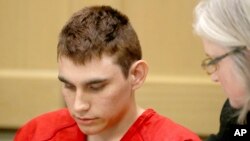The teenager accused in the mass shooting at a U.S. high school three weeks ago was indicted Wednesday on 17 counts of premeditated murder and another 17 counts of attempted murder.
Nikolas Cruz, 19, who was expelled from Marjory Stoneman Douglas High School in Parkland, Florida, last year, could face the death penalty in the case, but the prosecutor in Broward County has not announced whether he plans to seek it. No date has been set for Cruz's arraignment, a court hearing at which he can enter a plea in the case.
Cruz's attorney, Broward County public defender Howard Finkelstein, has said Cruz will plead guilty in the case if the death penalty is removed as an option, possibly sending him to prison for life.
Cruz has been jailed since he was arrested shortly after he allegedly gunned down 14 students and three adults, using an AR-15-style assault weapon to fire dozens of rounds of ammunition.
U.S. Education Secretary Betsy DeVos met with some students at the school Wednesday, later telling reporters that arming some teachers at U.S. schools to thwart future mass shootings should be an option but not a requirement. President Donald Trump has offered the same suggestion in response to the shooting, saying that teachers and administrators at schools should be armed only after undergoing extensive training.
But arming teachers is controversial in the U.S., with some education groups and law enforcement agencies opposed to the idea.
The Florida legislature, in the wake of the shooting, is considering several gun-related measures. Among them are bills that would increase the age required for all gun purchases in the state from 18 to 21; impose a three-day waiting period on gun purchases; and allow police to temporarily seize guns from people involuntarily committed to a mental health care facility or deemed by a court to be a danger to themselves or others.




